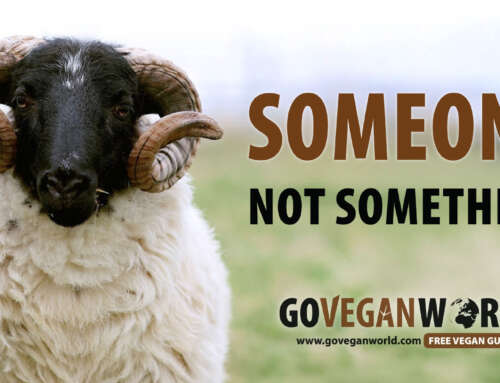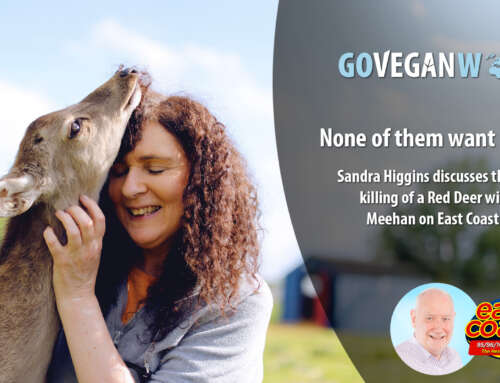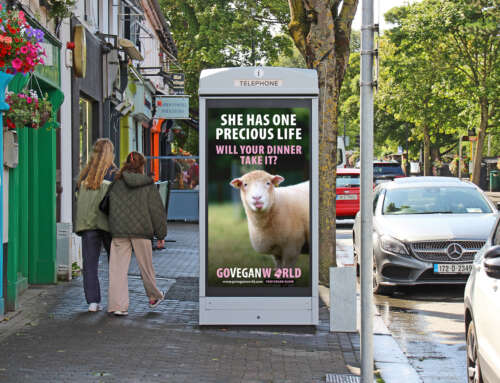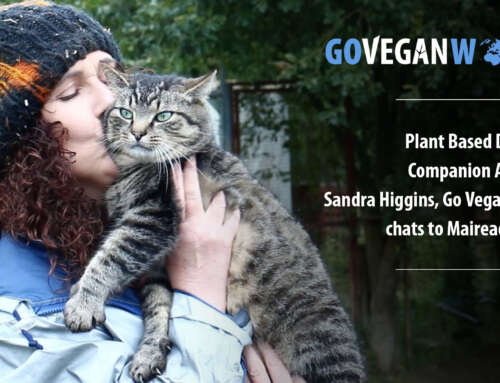West Cork TD Michael Collins calls vegan activist group’s campaign ‘BS’ and ‘childish’
He also said the ad was an “assault on Irish agriculture”.
https://www.corkbeo.ie/news/west-cork-td-calls-vegan-26053478
24th January 2023
Climate Change and Human Rights
Just as DUP Johnathan Buckley criticised the Go Vegan World campaign in Northern Ireland a few weeks ago, Independent TD Michael Collins is quoted as referring to our 2023 New Year campaign as ‘Bullshit’, ‘Childish’, ‘part of a sustained and ongoing ideological assault on Irish agriculture’, ‘fringe idocy’, and a ‘childishly misinformed narrative’.
It is disappointing for someone in public office to resort to insult and negate the seriousness of the evidence linking animal agriculture to a significant contribution to total GHG emissions and environmental harm. The science is clear. While transitioning to a plant diet is not enough to prevent climate catastrophe; it is a necessary step. If we continue as we are, food emissions alone will bring us well beyond the point of disaster. Those who criticise our campaign and encourage farmers to feel as if they are being victimised, while doing nothing whatsoever to familiarise themselves with the science or prepare for a new way of farming, including securing the necessary subsidies and training for farmers to transition, could, with far more justification, be referred to as ‘anti-farmer’.
Irish farmers, and farmers worldwide, have come precariously close, on several occasions, to having no crops to feed farmed animals due to summer drought, as a result of climate change. Farmers in parts of the world that are most impacted by climate change caused by those of us in wealthier countries, are struggling to farm at all. This should give us some insight into how climate change is not only caused by how we live, including our consumption of animal products, but will make it exceedingly difficult for us to farm and produce food in the future if we do not act now to reduce emissions. Every life, human and non-human, has the right to a safe environment that sustains their needs. We do not have the right to live as we do when it has consequences for others.
Animal agriculture does not exist in a vacuum. It exists to meet the demands of the non-vegan public. Our campaign encourages members of the public to be aware of the consequences of consuming animal products and to transition instead to a plant diet and live vegan. Most people believe that taking shorter showers, not using their tumble dryer, or cycling to work, are the most effective actions they can take to reduce emissions. They are not aware that changing what they eat is much more effective and would be easy addition to their current efforts. Surely members of the public have a right to this information?
The Science of Animal Agriculture and Climate Change
We have reproduced the sources of our data several times on our website, on social media, and they are on our ad for everyone to check and vouch for, for themselves.
Irish Statistics
Agriculture is the single largest contributor to the overall emissions, at 37.5%. Transport, energy industries and the residential sector are the next largest contributors, at 17.7%, 16.7% and 11.4%, respectively.
The agriculture sector is responsible for the largest sectoral contribution to the total emissions. Within that, enteric fermentation, and manure management account for over 70% of the agriculture emissions.
Global statistics
The new data finds that 31 per cent of human-caused GHG emissions, originate from the world’s agri-food systems.
Plant Foods have Lower Emissions than Animal Products
It is very clear that animal products have significantly higher emissions than plant products, because they are more resource intensive. Even the animal products with the lowest emissions, are higher than plant products (Poore J, Nemecek T. (2018) Reducing food’s environmental impacts through producers and consumers. Science. 2018 Jun 1).
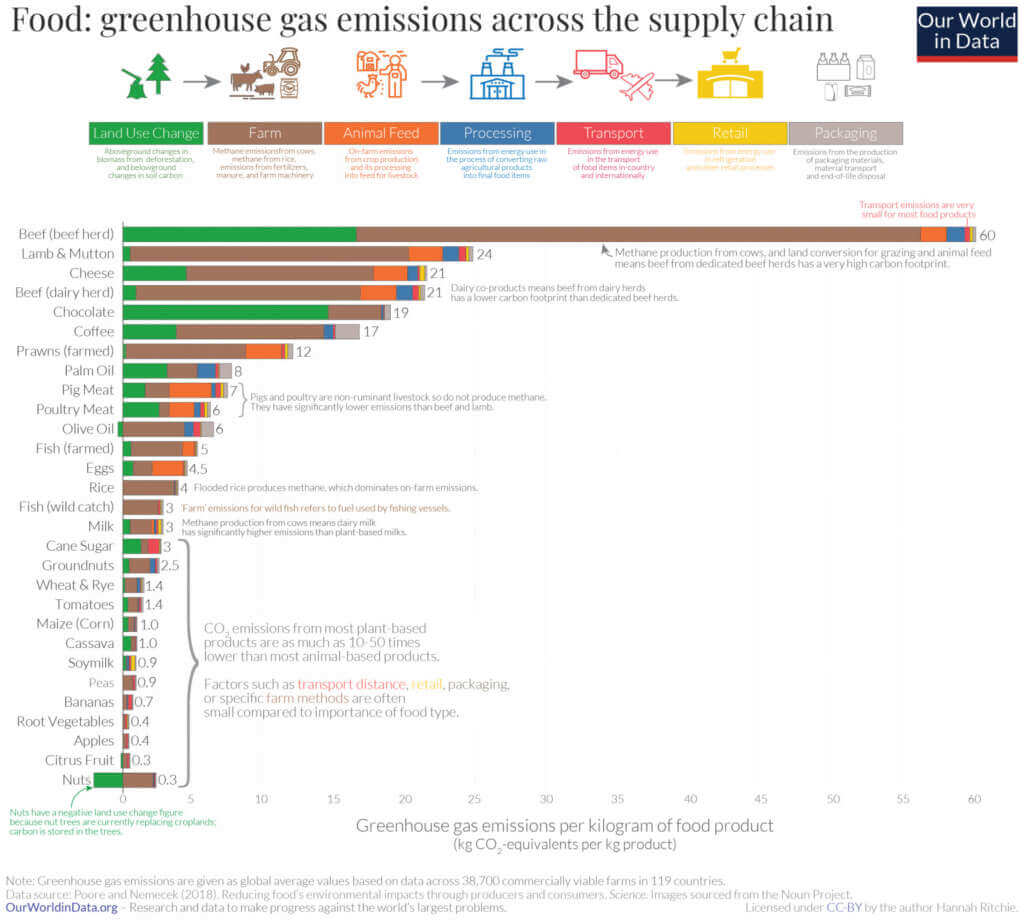
Analysis of the products most people buy in Irish and UK supermarkets, which more usually include several constituent ingredients, replicates the finding that plant foods have lower emissions. They also have more than adequate nutrition. Although we advocate a primarily wholefoods plant diet which is the cheapest, most nutritious, and most environmentally friendly, the latest study shows that even processed plant foods contribute fewer emissions than animal products (Clark, M, Springmann, M, Raner M, Harrington, R (2022) Estimating the environmental impacts of 57,000 food products, Proceedings of the National Academy of Sciences (PNAS), Vol 119, No 33.)
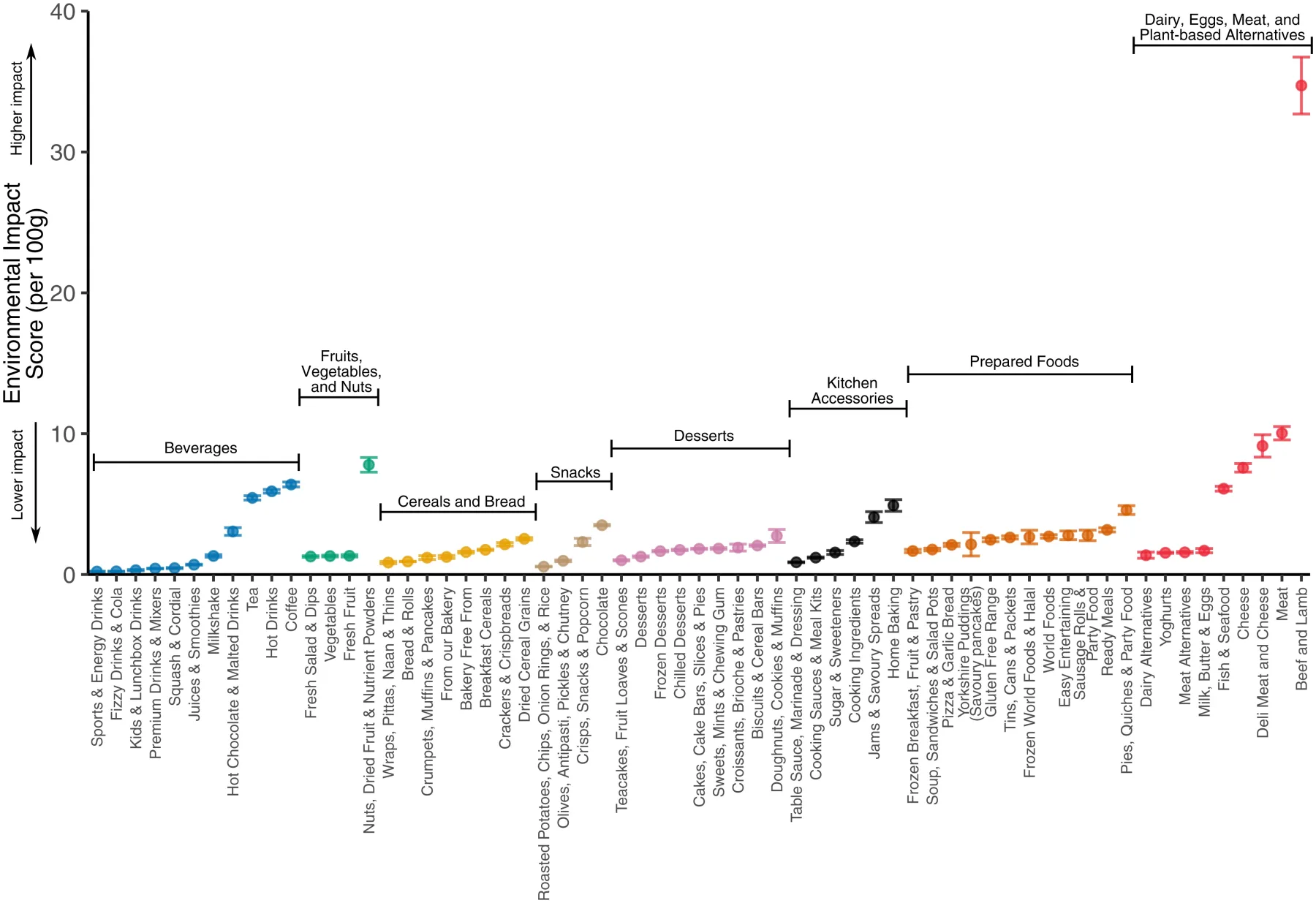
Farmed Animals and the Land They Occupy are the Biggest Problem
It is the very existence of farmed animals themselves, and the use of the land they occupy, that is the most serious problem. The transport and energy aspects of animal products are a much smaller part of the total agricultural emissions. It makes sense that elimination of animals from farming would solve many problems: our environmental problem including climate change, our ability to supply adequate nutrition to our growing human population, and the ethical problem of breeding sentient animals to kill and use as our resources which cannot be morally justified.
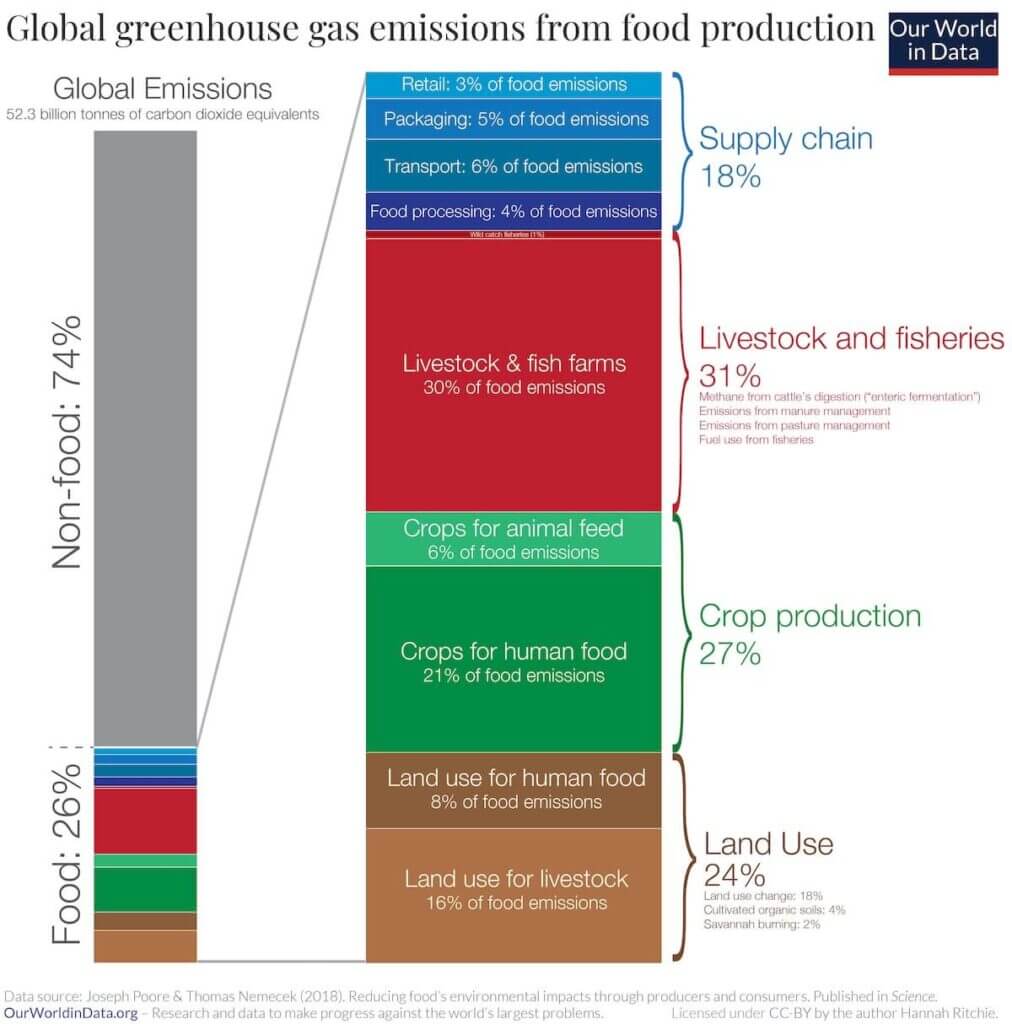
The Future of Farming is Non Animal Agriculture
Scientists have modelled the amount of greenhouse gas emissions that would be emitted from food systems this century across a range of scenarios.
If we continue as we are in a business as usual scenario that includes animal agriculture, it is expected that we will emit around 1356 billion tonnes of CO2-we by 2100. This would take us well beyond the carbon budget for 1.5°C – we would emit two to three times more than this budget. And it would consume almost all of our budget for 2°C.
We cannot afford to omit food emissions from our efforts to tackle the climate catastrophe.
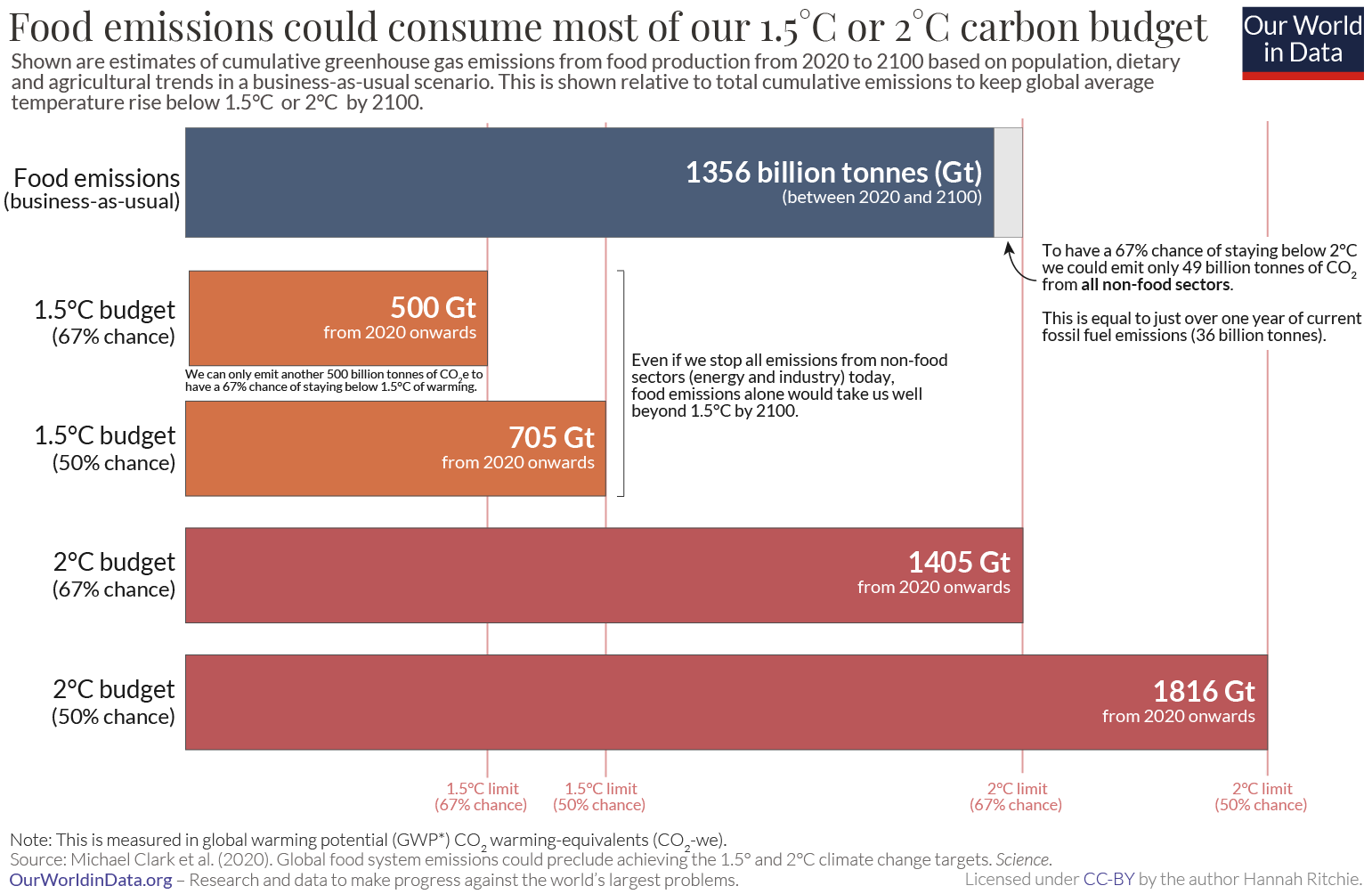
Veganism is Not an ‘Attack on Farmers’ or ‘Anti-Agriculture’
The problem is simple: animal products are environmentally harmful and cause higher emissions than plant foods. It makes sense to promote the elimination of animal use, veganism, and a plant diet, and support farmers to make the necessary transition.
We have reiterated over and over again that we are not anti-farmer or anti-agriculture. We are not sure what our antagonists know about how vegans eat and live. But let us assure them that vegans have the same needs as non-vegans and we depend on farmers to meet them, If we are to address our emissions problem and farm in a way that is sufficiently sustainable to feed our growing population, we will need farmers more than ever to produce more plant foods and engage in ethical, more environmentally friendly methods of land use. To say that a vegan campaign is anti-farmer or anti-agriculture is extremely short-sighted and lacking in factual information about the future we face. In fact, those who defend the status quo of animal agriculture do not have farmers’ interests at heart. If they did, they would instead be working for subsidies and supports to encourage and enable farmers to change to non-animal agriculture.
A Plant Diet is Necessary But Not Sufficient: Veganism is the Solution
However, while a plant diet is a necessary part of reducing emissions and ameliorating environmental harm and loss of biodiversity, it is not sufficient to solve our problems.
Unless we are vegan; unless we confront the speciesism that makes us feel entitled to use the resources of the world regardless of the consequences for other forms of life; and unless we unlearn the myth that humans are the only species that matters, we will not address the climate catastrophe, environmental destruction, or indeed, social injustice. Vegans recognise that others are equal to them, and that they have rights. In a vegan world, we would not engage in any behaviour that compromised the lives of others, or indeed, our own future. At the macro level of analysis, veganism is most certainly a vital part of the solution to the crisis we have created.
Farmers Exploit Animals for Profit, Slaughterhouses Kill Them but Non-Vegans Pay for it
TD Michael Collins is quoted as believing that Go Vegan World “will not rest until the farmer who sells his stock is equated, in a moral sense, to almost being like a murderer.” This is typical of the narrative that presents farmers as victims when the true victims are the humans affected by intersectional issues such as climate change and the health consequences of animal agriculture, and the billions of animals bred and killed, violently and unnecessarily, every year. Even if using other animals to meet our needs was not environmentally destructive; even if it did not contribute significantly to GHG emissions; vegans respect that other animals are sentient beings with rights. They are not ‘stock’; they are feeling beings who have relationships, emotions, and an interest in living. Yes, it is immoral to breed and kill them. But we have always reminded members of the public that the onus is on consumers not to pay for exploitation, violence, and unnecessary killing. If we don’t pay for it, farmers will not exploit animals, and slaughterhouses will not kill them.
References
Clark, M, Springmann, M, Raner M, Harrington, R (2022) Estimating the environmental impacts of 57,000 food products, Proceedings of the National Academy of Sciences (PNAS), Vol 119, No 33.
Poore J, Nemecek T. (2018) Reducing food’s environmental impacts through producers and consumers. Science. 2018 Jun 1.


